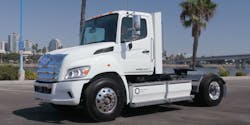Hexagon Purus to supply Battery Packs for Hino Motors’ truck platforms in U.S.
Hexagon Purus has signed a letter of intent with Hino Motors Manufacturing U.S. Inc. to supply battery packs for Hino truck platforms.
Hexagon Purus is already a development partner in the truck manufacturer’s ‘Project Z’ Battery Electric Vehicle program. It will continue through the development phase of the project in 2022, begin customer demonstrations in 2023 and commence serial production in 2024. The serial production will cover multiple platforms, including Hino’s Class 6, 7 and 8 commercial trucks.
The total value of the agreement over the contract tenure is estimated at $1 billion.
“Commercial trucks use the most fuel and produce the most emissions in the transport sector, accounting for more than 40% of all road freight emissions," Todd Sloan, EVP systems at Hexagon Purus. "The mass adoption of zero emission battery (BEV) and fuel cell (FCEV) electric trucks among fleets will be key to decarbonizing the sector. Hino’s move to serial production will accelerate the green shift in commercial transportation, and Hexagon Purus is proud to be a part of this transition.”
The agreement covers aftermarket support and service. Initial production will start from Hexagon Purus’ new facility in Kelowna, Canada.
About the Author
EnergyTech Staff
Rod Walton is head of content for EnergyTech.com. He has spent 17 years covering the energy industry as a newspaper and trade journalist.
Walton formerly was energy writer and business editor at the Tulsa World. Later, he spent six years covering the electricity power sector for Pennwell and Clarion Events. He joined Endeavor and EnergyTech in November 2021.
He can be reached at [email protected].
EnergyTech is focused on the mission critical and large-scale energy users and their sustainability and resiliency goals. These include the commercial and industrial sectors, as well as the military, universities, data centers and microgrids.
Many large-scale energy users such as Fortune 500 companies, and mission-critical users such as military bases, universities, healthcare facilities, public safety and data centers, shifting their energy priorities to reach net-zero carbon goals within the coming decades. These include plans for renewable energy power purchase agreements, but also on-site resiliency projects such as microgrids, combined heat and power, rooftop solar, energy storage, digitalization and building efficiency upgrades.
